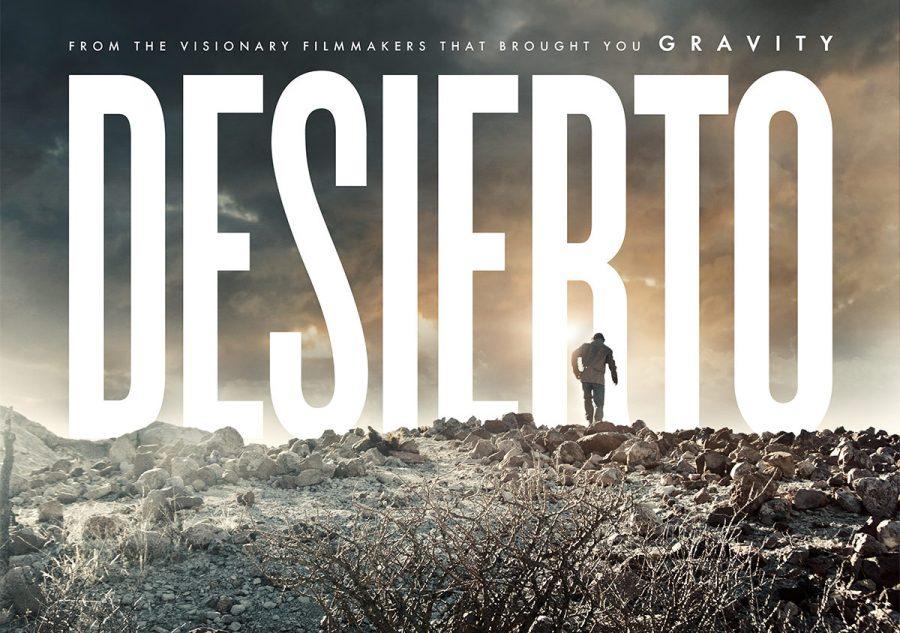“Desierto” is the first full-length film by Mexican director Jonas Cuaron. After co-writing the award-winning “Gravity” with his father, Alfonso Cuaron, Jonas co-wrote, produced and directed “Desierto.” The thriller is about immigrants crossing the desert while an American vigilante and his dog hunt them down.
Cuaron collaborated with actors Gael Garcia Bernal and Jeffrey Dean Morgan, who both play their characters well. Garcia Bernal plays Moises, a Mexican immigrant doing his second run across the border after being deported. Moises wants to reach the United States, not for the prospect of living a better life, but for his son, who he promised to come back for.
Morgan plays the character Sam, the embodiment of the staunchest of Republicans. He’s an alcoholic, who exercises his second amendment right and owns a dog with no name. His truck waves the Confederate flag and booms with country music, and he does not approve of the sloppy job done by the Border Patrol. He’s an American citizen, who feels strongly about undocumented immigrants crossing the border and the crimes they commit once they cross.
In our current political state, immigration is a provocative topic that both the left and right feel strongly about. “Desierto” comes at just the right time because it literally represents the current state of affairs and the radical mentality that some individuals have concerning undocumented immigrants.
Although the message of this movie is important, the strength of its delivery fell flat. What could have been a decisive movie turns out to be merely a whisper.
The movie was not awful. It was entertaining and had good production value, but the vitality of its topic deserved more. “Desierto” is at most a B-movie.
Even though “Desierto” has opposing characters share the screen, their effect feels stunted. The motives that drive each character could have been explored, but there’s little to know about them and almost nothing that makes them relatable. Sure, the movie is fast paced—it is a chase after all—but there’s no time to dig into the back story of each character, and this leaves only the hunter and hunted on the screen.
The characters may be flawed and have their shortcomings, but the sense of reality they have with the film is important. For one, the characters speak Spanish and not accented English. There’s little Hollywood glamor in the faces and clothes of the actors. They sweat and bleed, they get dirty when they fall and they’re no match for an armed vigilante. They don’t try to outmatch him because in the real world there is not much an immigrant can do against a sharp shooter.
“Desierto” forgets about the glamor and focuses on the story. Its setting, which gives this film its title, is a character as well. The film was shot in Baja California, Mexico. Not only does it represent the hardship that many immigrants go through under the scorching sun and over the boiling sand, but it also plays the role of the neutral character. It does not care about the immigrants and it does not aid the hunter either.
Cinematographer Damian Garcia shows the beauty of the desert through shots at dawn and dusk, through the color of its shale rock and sand and in the vast collection of cacti that inhabit the desert. In one scene, the American vigilante talks about a time when he loved the desert, but now he loathes it. Whether he hates it because of the immigrants is not mentioned, but this scene explains in detail the sentiment toward the desert; a love-hate relationship. Nature is not just beautiful for its sights, but for its indifference as well.
Cuaron displays a sense of storytelling in his first full-length film. The shots and editing of the film are messy and quick; it shakes and stops to breathe. Cuaron takes his time. He stops to look at the characters. He explores various points of view. He allows the audience to hang around with the immigrants, with the vigilante and even with the dog and gives the audience their own view, where they can see all the players. His shots may be coherent, but they still lack something. There’s an essence missing. It seems at times that what’s on the screen are images, not something physical.
It’s easy to sit here and criticize a young director’s first film. But despite the flaws, there is a promise. Cuaron chose to deal with real subjects. He approaches a story and pays close attention to the reality they face, not a Hollywood fantasy. There is something significant going on and to achieve that takes special talent or time. There is no doubt that Jonas Cuaron will bring forth important films in the future with better production.
Andres Gallegos may be reached at [email protected].






